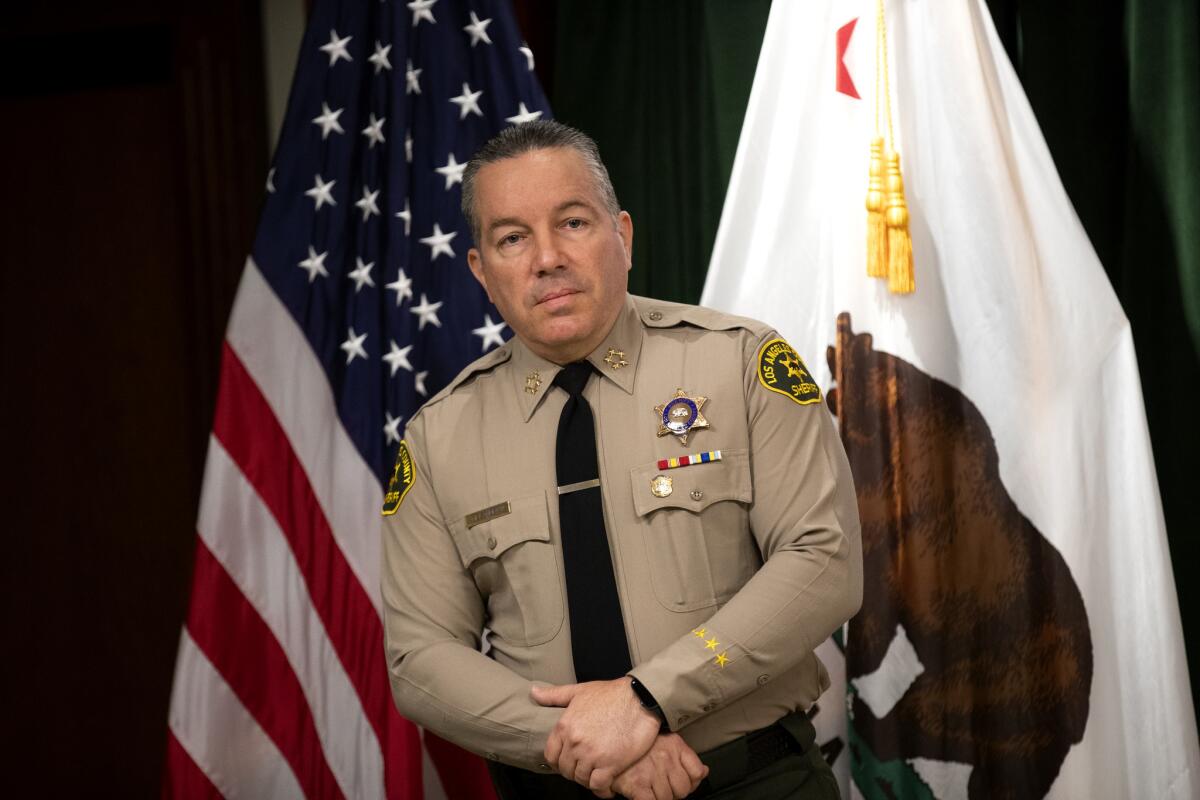Sheriff’s plan to check on high-risk kids nixed after opposition from child protective services

- Share via
A proposal by the Los Angeles County sheriff to have deputies check on children considered at risk of abuse during the COVID-19 pandemic was rejected after the county’s director of child protective services said the action might do more harm than good.
The threat of the novel coronavirus has shut schools, curtailed medical visits and largely hidden the lives of children behind closed doors, leaving mandated reporters such as teachers, doctors, counselors and coaches little opportunity to observe and report the signs of suspected abuse. Such reports have dropped by as much as 50% in L.A. County, according to child protective services.
Sheriff Alex Villanueva last month announced a plan “to do welfare checks on our most at-risk kids with patrol personnel,” working in conjunction with the Department of Children and Family Services and other stakeholders to identify high-risk minors who had not had contact with their schools.
Villanueva said he did “not want another Gabriel Fernandez or another Anthony Avalos,” referring to two Antelope Valley boys who were killed after repeated incidents of abuse at home.
But after several weeks of discussions, the DCFS aid it would not participate. A member of the Board of Supervisors, Sheila Kuehl, also voiced opposition to using deputies in such a function.
The move comes against a backdrop of growing hostility between the supervisors and Villanueva over his powers, his budget and oversight of his department that has seen him stripped of control of county emergency management.
County officials, however, said their opposition focused on the best interests of children and concerns that the plan would be seen as targeting minority and disadvantaged communities. The proposal had also drawn scrutiny from some children’s advocates.
Bobby D. Cagle, head of the DCFS, said in a statement to the Times that the agency had initial discussions with the Sheriff’s Department about “potential joint temporary efforts” to offset the significant drop in reporting of child abuse.
“In the end, DCFS decided that sending a uniformed law enforcement officer to a family’s home without any articulable suspicion of child abuse or neglect would not necessarily improve safety for children,” Cagle said. “To the contrary, such an action might increase stress on families and children, especially those in already marginalized communities, during one of the most stressful times most have ever experienced.”
Cagle said the agency is mobilizing to insure vulnerable children are protected, including comprehensive media outreach asking the community to be especially vigilant about the welfare of children. He said he appreciates the sheriff’s “willingness to put forward ideas” and remains willing to continue the dialogue.
But Kuehl wasn’t so generous during a board meeting Tuesday, voicing strong opposition to the sheriff’s idea.
“We had an ongoing issue recently with the sheriff. ... He identified some need that came out of his own head, I think, to send his deputies to the homes of children who did not log on for their education with ... L.A. Unified and other districts,” said Kuehl. There may be legitimate reason some children cannot log in online for schooling, she added.
“There was no partnership, and DCFS has its own social workers. It does not want law enforcement to bang on doors about this,” she said.
Villanueva said others in county government had been supportive of the plan until representatives of the supervisors “started throwing rocks at it.” He said Cagle did an “absolute 180” when he called to discuss it.
“I heard what the supervisor said about us banging on doors. One, we are part of the community ourselves. We interact with all these community members and families on a regular basis. We are the only visible part of the county government 24/7,” the sheriff said.
He said the intent was to build a partnership with schools and the DCFS to let his deputies do a “soft knock” to insure kids were unharmed.
“In the middle of a pandemic when we lose sight of our at-risk youth, it is just a prudent thing to do. Their welfare is our priority. But the board decides to play politics with it because for some reason they don’t want us to collaborate with other county departments.”
In a letter to board chairwoman Kathryn Barger Wednesday, Villanueva said the plan was “sabotaged” and asked that it be reconsidered.
“Contrary to Supervisor Kuehl’s public statement regarding child welfare checks, the only persons who do not want deputies to be “banging on people’s doors” are the ones harming their children,” he wrote.
Just a few weeks ago, Diane Iglesias, senior deputy director for DCFS, sent an email titled “LASD/DCFS Partnership during COVID-19.”
In it, an attorney for the child welfare agency recapped the plan for sheriff’s officials to reach out to 80 school districts to remind teachers of their mandated reporting duties and that deputies would be available for welfare checks when a district indicated concern. Evidence of abuse or neglect would be reported to the DCFS hotline.
Assistance from deputies, according to the email, would also be available “to DCFS social workers who though they continue monthly visits may have a concern about a family that does not rise to the level of suspected child abuse but where a family would benefit from a wellness check.”
The April 22 note was one of several emails obtained by The Times exchanged between the Sheriff’s Department and the DCFS as they attempted to finalize a plan.
Jennifer L. Braun, president and chief executive of the Alliance for Children’s Rights, said the idea of home visits by law enforcement “raises great concerns.”
“Clearly, targeting will impact marginalized and underserved communities and communities of color that are often subject to disproportionate scrutiny and have often had traumatic experiences with law enforcement,” she said. “Howeve well-intentioned the officer may be, that kind of presence is only going to exacerbate things and create additional trauma.”
Villanueva’s push for a more active role began after the Sheriff’s Department saw suspected-child-abuse reports in March fall to about 4,200 compared with 5,218 the year before. The drop was even more dramatic in the first week of April, with 662 reports compared with 1,352 in the same month of 2019. The DCFS saw a similar drop in reports.
More to Read
Sign up for Essential California
The most important California stories and recommendations in your inbox every morning.
You may occasionally receive promotional content from the Los Angeles Times.











